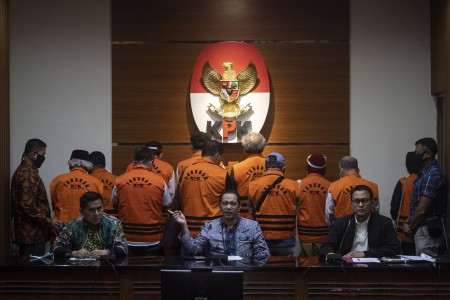Popular Reads
Top Results
Can't find what you're looking for?
View all search resultsPopular Reads
Top Results
Can't find what you're looking for?
View all search resultsWhich KPK leader has caught more suspects in their early days?
Spoiler alert: Current KPK chairman Firli Bahuri has arrested more graft suspects compared to his two predecessors, despite his focus on corruption prevention
Change text size
Gift Premium Articles
to Anyone
 Corruption Eradication Commission (KPK) deputy chairman Nurul Ghufron (left), KPK law enforcement deputy Karyoto (center) and KPK spokesman Ali Fikri (right) speak at a press conference on the arrest of 11 former North Sumatra legislative councillors in a bribery case at KPK headquarters in Jakarta on July 22. (Antara/Nova Wahyudi)
Corruption Eradication Commission (KPK) deputy chairman Nurul Ghufron (left), KPK law enforcement deputy Karyoto (center) and KPK spokesman Ali Fikri (right) speak at a press conference on the arrest of 11 former North Sumatra legislative councillors in a bribery case at KPK headquarters in Jakarta on July 22. (Antara/Nova Wahyudi)
W
hile critics have slammed him for prioritizing prevention over law enforcement, recent data show that Corruption Eradication Commission (KPK) chairman Firli Bahuri has led the agency to arrest more graft suspects compared to his predecessors.
Over his first six months of leading the country’s anticorruption agency, Firli said he would prioritize preventive measures first, such as pushing for systemic governance reform and stepping up anticorruption education among the public. This has led to criticism from activists, who say that such an approach has diminished the public’s trust in the KPK.
However, according to data compiled by The Jakarta Post, under Firli, the KPK has detained 60 graft suspects as of Aug. 18 -- roughly eight months after President Joko “Jokowi” Widodo appointed him as the commission’s chairman.
The latest arrest was that of Rachmat Yasin, the former regent of Bogor in West Java who was named a suspect for allegedly embezzling money from various agencies between 2008 and 2014.
In comparison, the graft busters only detained 28 suspects during the first eight months of Agus Rahardjo’s tenure from 2015 to 2019. The antigraft body made even fewer arrests during Abraham Samad’s term from 2011 to 2015 with 22 arrests.
Most of the detainees were members of the legislative body at the national and regional level, with 22 suspects. Half of them were former North Sumatra councillors, who were detained on July 22 for their alleged role in a bribery case implicating former governor Gatot Pujo Nugroho, who was convicted in 2016.
Despite the higher score, more than half of the suspect namings--36 suspects--were the result of investigations that had begun prior to Firli’s term. Graft busters had only named 24 suspects from new investigations.
Moreover, only six suspects had met their fate in court.
Read also: Drastic action needed to save KPK amid controversies, lackluster performance: Activists
Activists suggest that the high number does not necessarily translate to the KPK’s good performance under Firli’s leadership.
Indonesia Corruption Watch (ICW) activist Kurnia Ramadhana said the KPK still had a long list of unresolved major cases. He added that the antigraft body had yet to show seriousness to solve them.
The long list includes the e-ID graft case that cost the country Rp 2.3 trillion (US$155 million), the Bank Indonesia liquidity support (BLBI) bailout graft case that caused an estimated Rp 4.5 trillion in state losses and the Rp 7.4 trillion Bank Century graft case.
Kurnia went on to say that investigators had also launched fewer operations to arrest graft suspects, as Firli’s KPK only scored two this year.
“Detention is only a part of a long process. Despite the high number of [suspects] detained, a lot of problems behind the scenes aren’t sorted out yet; therefore, the detention can’t be justification [for good performance],” he said recently.
Zaenur Rochman of the Gadjah Mada University Center for Anticorruption Studies (Pukat UGM) urged Firli to lead the KPK to focus on strategic sectors, which usually caused the most state losses, as the commission had limited number of investigators.
Read also: Turning employees into civil servants will not affect KPK's independence: State Palace
Among the strategic sectors is the health sector, as the government is expected to spend at least Rp 677.2 trillion to handle the COVID-19 outbreak.
Another area is corruption involving law enforcement officers. “This area is important because [good] law enforcement is a key to eradicating graft. We can’t clean a room with a dirty broom,” said Zaenur.
KPK acting spokesperson Ali Fikri accepted the criticism. “We’re trying our best to eradicate corruption in the country,” he said on Sunday.









